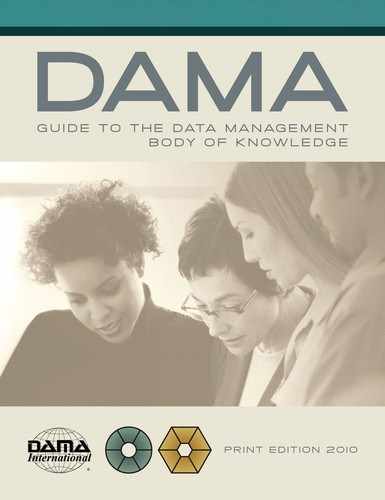It is well known that truth and good advice varies with its context. Because of this phenomenon, it may seem bold to attempt to capture a Body of Knowledge, Best Practices or Principles. Ultimately though, it is the variety of opinion and the dependency on context that makes the subjects rich and deep.
We at DAMA International have been working on a Data Management Body of Knowledge Guide (DAMA-DMBOK Guide) in various forms for many years in our Guidelines for Implementing Data Resource Management (Versions 1 through 4) and now in our more formalized structured Guide. It has been a complex project envisioned, sponsored and run by DAMA International VP Education and Research Deborah Henderson. The advisory DAMA-DMBOK Editorial Board supported the process and advocated for the finished product.
The DAMA-DMBOK Guide in its form has been in development for over four years and is a complete overhaul of the earlier Guidelines mentioned above. Starting in a winter storm in 2004, Deborah Henderson traveled to the Chicago DAMA Chapter meeting and presented the first structured framework for a ‘body of knowledge’ for data management. She asked for input and volunteers to bring this big vision into reality. Mark Mosley stepped up as Editor—Development and began with a white paper framework published as a free download on our DAMA website. That white paper went through three major revisions to date. Updates on progress have been given at regular intervals to the DAMA Board and the membership at meetings and conferences. The interest and input in the revisions of the initial framework is truly global with over 3500 downloads in three languages from over 78 countries, and still climbing.
We quickly discovered that understanding our own language was a very important pre-requisite. Development of a Glossary for the Guide started in 2007 and it soon became a substantial work in itself; indeed it could stand by itself. DAMA responds strongly to limited and dated definitions of data-centric terms that have been propagated since the 1960s and 1970s. Data Management is not ‘using an application’, or a synonym for ‘database administration’. The DAMA-DMBOK Dictionary, published separately in 2008, is the glossary for the Guide and is now a companion to the DAMA-DMBOK Guide. The Dictionary has been received with enthusiasm. We heard back from many users of the Dictionary, some of whom have decided to leverage it across their corporations for its completeness and authority.
The DAMA-DMBOK Guide was written based on the Framework paper, and was developed in a collaborative manner involving many primary and secondary contributors and many draft peer review sessions as well as its own development website. Over 40 reviewers participated in the draft review sessions. Assistant Editor Susan Earley doggedly followed up, incorporating the comments into the second level drafts. These drafts proceeded, chapter by chapter, into copy editing and manuscript development.
The current DAMA-DMBOK Guide is a baseline edition. DAMA International intends to mature the Guide with regular future editions. It is developed as a ‘guide’ and readers should expect that it covers data management functions at a certain depth augmented with chapter focused bibliographies of significant further reading.
Our work at DAMA International parallels the development of the data management profession itself. The maturity of the profession is reflected in the emerged DAMA certification program and the DAMA continuing education program. It is also reflected in the DAMA involvement with other organizations and government bodies to influence and partner their activities such as curriculum development for data management professional education and international data management standards. The DAMA-DMBOK is part of this overall integrated push to represent Data Management profession world-wide.
Publication of the DAMA-DMBOK Guide has been the most pressing issue from our data community. We hope it doesn’t disappoint that community. We will correct any errors by omission or commission in future editions. Looking ahead, DAMA intends to update the DAMA-DMBOK Guide by publishing regularly scheduled revisions. As it evolves we will be more tightly coupling our certification, education and research and industry programs.
The DAMA-DMBOK Guide is truly a journey not to be represented in just one edition. As new perspectives develop in data management we will be there, updating and challenging the best practices in our profession. Your comments, concerns and contributions are welcome, as we are already planning our next edition. Please contact the editors at [email protected].
The mission of the DAMA Foundation (a nonprofit 501(c)3 organization, #602-388-362 State of Washington, 2004) is to foster awareness and education within the Data Management industry and profession. Donations to support this mission are needed to continue to grow this focused and valued community. All moneys will be used for development programs and fundraising as well as general operations. Monetary tax deductible gifts may be sent to the DAMA Foundation, 19239 N. Dale Mabry Highway #122, Lutz, Florida 33584 U.S.A.
Deborah Henderson
DAMA-DMBOK Guide Sponsor
VP Education and Research DAMA International
President DAMA Foundation
Toronto, Canada
John Schley
President DAMA International
Des Moines, Iowa, USA
